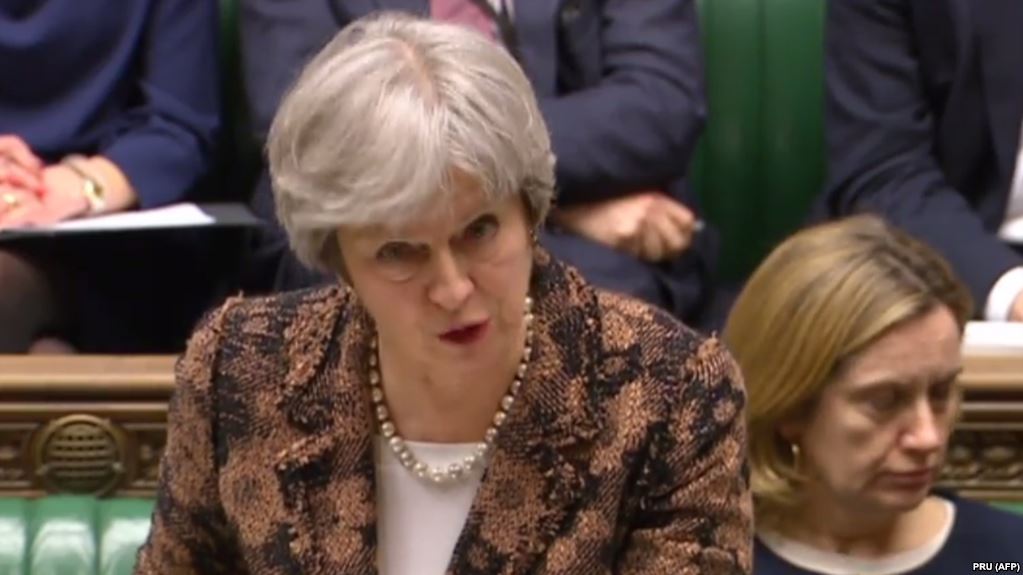
By Polygraph
“We have already made a statement that this is all nonsense, we have nothing to do with this”
False
The nerve agent is developed by Russia
The Russian Foreign Ministry summoned the British Ambassador to Russia, Laurie Bristow, on March 13 to convey a “strong protest” against London’s accusation that Moscow was involved in the attempted assassination of the ex-GRU spy and his daughter on March 4.
“It is now clear that Mr. Skripal and his daughter were poisoned with a military grade nerve agent of a type developed by Russia,” British Prime Minister Theresa May told the Parliament on March 12. “This is part of a group of nerve agents known as Novichok.”
May said “world-leading experts” at Britain’s Porton Down research facility, which the government says is dedicated to chemical and biological weapons countermeasures, had positively identified the chemical agent.
Saying there is “no alternative conclusion, other than that the Russian state was culpable for the attempted murder,” May told the British Parliament she is expelling 23 Russian diplomats. The prime minister threatened to freeze some Russian government assets and she suspended high-level diplomat contacts, revoked the invitation to Lavrov to visit Britain this year and said the royal family would not attend the World Cup in Russia..
“The Government has concluded that it is highly likely that Russia was responsible,” May said, noting “Russia’s record of conducting state sponsored assassinations.”
Lavrov’s claim that Russia had “nothing to do” with the poisoning is false given that the poison used was developed in Russia.
Tuesday, The White House also said President Trump agreed “that the Government of the Russian Federation must provide unambiguous answers regarding how this chemical weapon, developed in Russia, came to the used in the United Kingdom.” The statement was a “readout” of a telephone call between Trump and May.
According to the Federation of American Scientists, in October 1991, Vil Mirzayanov, a chemist who had worked for more than 25 years in the Soviet chemical weapons program, alleged that Moscow had developed a series of new and extremely lethal “third generation” nerve agents under a secret program code-named Foliant. His assertions were confirmed by two other scientists, Lev Fedorov and Vladimir Uglev. It was also claimed that Russia was working on developing new binary chemical warfare agents under the designation Novichok [“New Guy”].
Mirzayanov alleged that Russia intended to test and produce binary chemical weapons after the ratification of the Chemical Weapons Convention.
According to experts, nerve agents of the “Novichok” group are the “deadliest ever made.”
After accusing Russia of “indiscriminate” use of the poison, which “put the lives of innocent civilians at risk,” British Prime Minister May gave Russian President Vladimir Putin until midnight March 13 to explain or face “extensive measures.”
Russia has responded with denials and counter-accusations and warned of reprisals of its own.
“Moscow does not accept the groundless accusations or the language of ultimatums,” said Dmitry Peskov, Vladimir Putin’s spokesman.
May said Moscow had treated the affair with “sarcasm, contempt and defiance.”
“Russia’s position regarding the poisoning of Skripal and his daughter is limited to aggressive denial: we did not do that but that is going to happen to every traitor,” wrote Anton Orekh, a journalist with Echo of Moscow radio station.
Ben Nimmo, a senior analyst with the Atlantic Council’s Digital Forensic Lab, highlighted and debunked the Russian government narrative regarding the poisoning via Twitter, saying it followed ”a familiar pattern: dismiss, distort, distract, dismay.”
Thread: The Kremlin’s initial response to the #Skripal #Novichok accusation resembles a familiar pattern: dismiss, distort, distract, dismay. https://t.co/jXZktzkKIJ
— Ben Nimmo (@benimmo) 13 марта 2018 г.
The Kremlin-funded media outlets RT and Sputnik posted series of reports implying that the British accusations are “anti-Russian propaganda” and a “provocation” cooked up by the U.S. and British intelligence services.
Britain’s communications regulator, Ofcom, said that it would consider the implications of the prime minister’s statement for RT’s broadcast licenses – a threat to take regulatory action against the Russian state media outlet.
“Should the UK investigating authorities determine that there was an unlawful use of force by the Russian State against the UK, we would consider this relevant to our ongoing duty to be satisfied that RT is fit and proper,” Ofcom stated.
By Polygraph
© 2018 POLYGRAPH.info All Rights Reserved.




